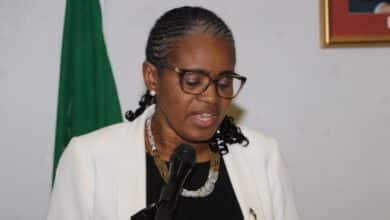
The Federal Ministry of Communications and Digital Economy (FMCDE) declared on May 3rd that a national blockchain policy had been approved.
The action was hailed as revolutionary and indicative of the government’s pro-technology stance. However, a number of industry observers are voicing concerns about implementation and posing a crucial query: why is cryptocurrency still illegal in a government that supports blockchain technology?
In a decentralized public ledger, transactions are recorded using database techniques in the cutting-edge technology known as blockchain. Blockchain proponents see it as a cutting-edge technology that can be used to optimize every aspect of human life, from supply chains and identity management to financial services and healthcare.
The Federal Ministry of Communications and Digital Economy (FMCDE) cited a PricewaterhouseCoopers (PwC) report in the announcement, which estimated that the widespread adoption of blockchain technology across various industries could potentially contribute $1.76 trillion, or 1.4% of global GDP, to the global gross domestic product by 2030.
The national blockchain policy was created by the FMCDE after consulting with stakeholders in the public and business sectors. The national digital economy policy and strategy’s seventh pillar, which puts a strong emphasis on the digital society and emerging technologies, was followed in developing the policy on behalf of the Nigerian federal government.
The blockchain policy is an important move by the government to accommodate blockchain innovation in the country. After the ban on crypto, they can’t afford to be seen as a government that associates illegality with blockchain operators. Interestingly, this policy also provides a framework for eNaira, the blockchain-powered digital currency released by the CBN
Christian Duffus, founder and CEO of blockchain startup Fonbnk
Read Also: Adnian Labs Set To Boost Al & Blockchain Tech In Nairobi County
Decentralized ledger technology and blockchain, according to a draft of the blockchain adoption strategy published in October 2020, would “facilitate the development of the Nigerian digital economy.”
The goal of the policy is to create a blockchain-based economy that enables safe exchanges of value between citizens, companies, and the government. The public and private sectors in Nigeria are anticipated to benefit from the policy’s implementation.
I am one of the people that have been working on that policy project for the past three years.We want to unlock the power of blockchain in our national economy through a government-led approach. The goal is to entrench the use of blockchain in government processes, then roll it out to the masses.
However, we must realise that blockchain does not start and end with crypto. My real estate company, for example, is blockchain-powered, yet we don’t use crypto. Blockchain can help in many ways, including the tokenisation of properties, supply chain tracking, and authentication of documents. We will also see more interesting use cases come up in the future. As you know, the incoming administration has also promised to focus on blockchain technology.
Nnamdi Uba, the CEO of HouseAfrica
Under the direction of the FMCDE, the National Information Technology Development Agency (NITDA) will be in charge of organizing the policy efforts. A multisectoral steering committee has also been established to oversee the application of the strategy.
The National Universities Commission, the Securities and Exchange Commission, the Securities and Exchange Commission of Nigeria, and the Nigerian Communications Commission are among the regulatory agencies that the Federal Executive Council has directed to develop regulatory frameworks for the adoption of blockchain technology in various economic sectors.
Initiatives to create a consortium for blockchain in Nigeria, strengthen the legal and regulatory framework, promote digital identity, develop incentive programs for blockchain businesses, promote digital literacy and awareness of blockchain technology, and establish a national blockchain sandbox for testing and piloting are all part of the strategy for blockchain adoption.























